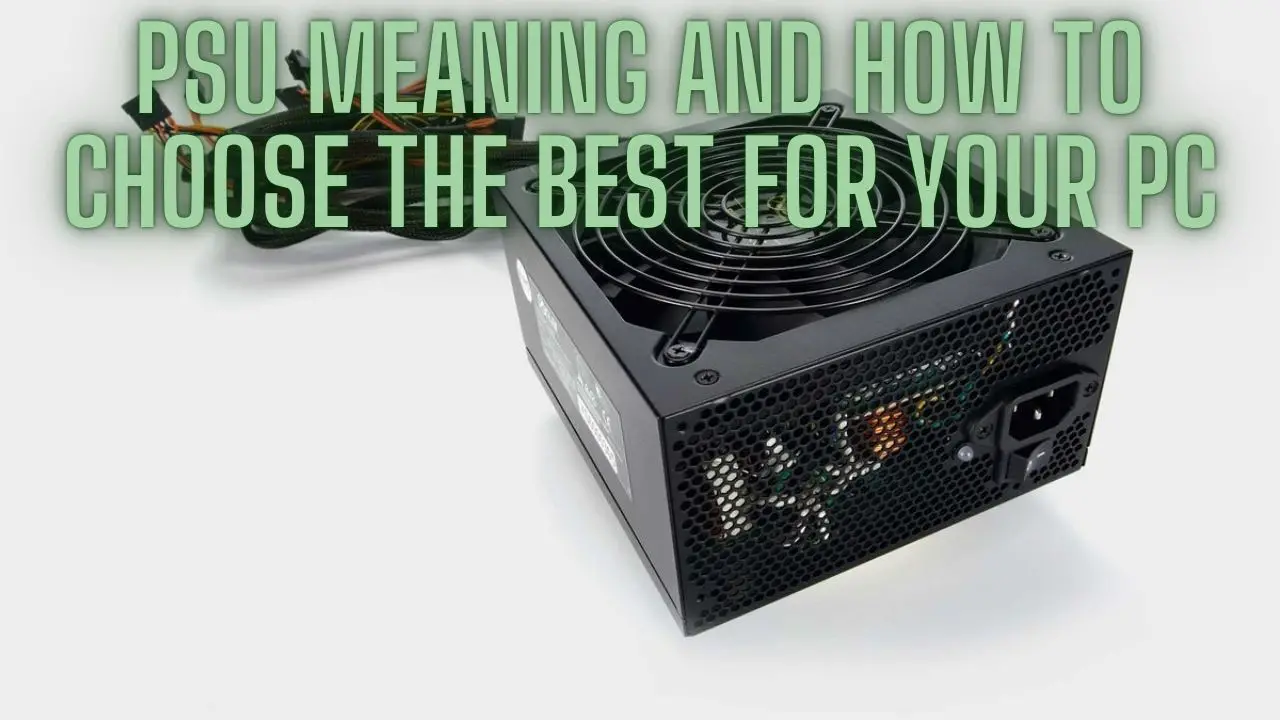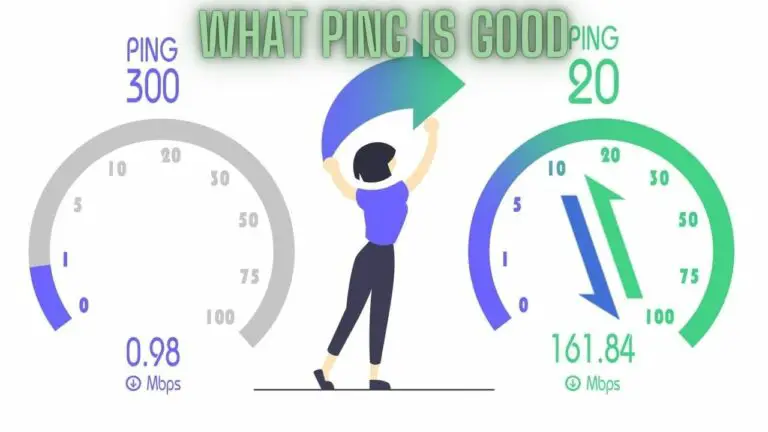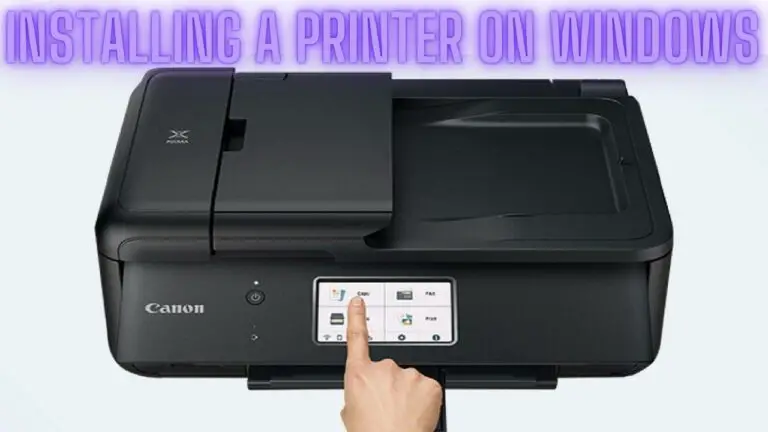PSU Meaning and How to Choose the Best for Your PC: A Comprehensive Guide
1. Introduction
Your computer’s power supply unit (PSU) may not be the most glamorous component, but it’s undoubtedly one of the most critical. A PSU is responsible for supplying power to all the components in your PC, ensuring they operate smoothly and reliably. Choosing the right PSU is vital to your computer’s performance and longevity. In this comprehensive guide, we’ll explore the meaning of a PSU, its importance, and how to choose the best one for your PC.
1.1. What is a PSU?
A Power Supply Unit (PSU) is a crucial component in your computer responsible for converting electricity from your wall outlet into a form usable by your computer’s internal components. It provides power to the motherboard, CPU, GPU, storage drives, and other hardware, ensuring your PC operates reliably.
1.2. Why is Choosing the Right PSU Important?
Selecting the right PSU is essential because it impacts your PC’s performance and longevity. An inadequate PSU can lead to unstable system operation, random shutdowns, or even hardware damage. Conversely, an overpowered PSU may be less energy-efficient and more expensive than necessary. In this guide, we’ll explore how to make an informed choice for your PSU.
2. Understanding PSU Specifications
2.1. Wattage (Power Rating)
The wattage of a PSU indicates its power output capacity. Choosing the right wattage ensures your PC receives sufficient power. However, a higher wattage PSU can provide flexibility for future upgrades.
2.2. Efficiency Rating (80 PLUS Certification)
PSUs are rated for efficiency, often denoted by the 80 PLUS certification. Higher efficiency PSUs waste less power as heat, reducing energy costs and heat output.
2.3. Form Factor
The PSU’s form factor refers to its physical size and shape. Different form factors are compatible with various PC cases, so selecting the right one is essential.
2.4. Connectors and Cable Management
Different PSUs come with varying connector options, including those for CPUs, GPUs, and peripherals. Cable management, whether the PSU is modular, non-modular, or semi-modular, affects cable clutter and airflow.
2.5. Modular vs. Non-Modular vs. Semi-Modular PSUs
Modular PSUs allow you to connect only the cables you need, reducing clutter and enhancing airflow. Non-modular PSUs have fixed cables, while semi-modular PSUs offer a combination of fixed and detachable cables.
2.6. Single Rail vs. Multi Rail PSUs
PSUs may have single or multiple 12V rails that distribute power to components. The choice depends on your specific system requirements and preferences.
2.7. Cooling and Noise
PSUs feature cooling fans to dissipate heat. The type of fan and its noise level are important considerations for your build, particularly if you desire a quieter PC.
3. Choosing the Right Wattage
3.1. Calculating Power Requirements
To determine the correct wattage, calculate the power requirements of your components. Online PSU calculators can assist with this process.
3.2. Considerations for Graphics Cards
Power-hungry graphics cards are essential factors to consider when selecting PSU wattage.
3.3. Overhead and Future-Proofing
Leaving some overhead ensures that your PSU doesn’t run at its limit, promoting longevity. Additionally, it allows for future component upgrades.
4. Efficiency and 80 PLUS Certification
4.1. What is Efficiency Rating?
Efficiency rating indicates how effectively the PSU converts AC power to DC power, reducing wasted energy and heat generation.
4.2. 80 PLUS Certification Levels
80 PLUS certifications come in various levels (e.g., Bronze, Silver, Gold, Platinum) denoting different efficiency thresholds.
4.3. The Impact on Energy Bills
Higher efficiency PSUs can lead to lower energy bills and reduced environmental impact.
5. Form Factor and Compatibility
5.1. ATX, Micro ATX, and SFX Form Factors
Different PSUs have varying form factors, such as ATX, Micro ATX, and SFX. Ensure your choice is compatible with your PC case.
5.2. Choosing the Right Size
Select a size that fits your case comfortably, allowing for adequate ventilation.
5.3. Compatibility with PC Cases
Check your PC case’s specifications for PSU compatibility and clearance.
6. Connectors and Cable Management
6.1. Understanding PSU Connectors
Learn about various PSU connectors, including those for the motherboard, CPU, GPU, SATA drives, and peripherals.
6.2. Modular Cable Management
Modular PSUs allow for customized cable arrangements, improving airflow and reducing clutter.
6.3. Benefits of Modular PSUs
Discover the advantages of modular PSUs, such as simplified cable management and a cleaner, more organized build.
7. Single Rail vs. Multi Rail PSUs
7.1. Single Rail PSU
Single rail PSUs offer simplicity and are often recommended for most users.
7.2. Multi Rail PSU
Multi rail PSUs divide power output for enhanced protection, particularly for high-end systems.
7.3. Which is Right for You?
Consider your specific requirements and preferences when choosing between single and multi rail PSUs.
8. Cooling and Noise
8.1. The Role of Cooling
The PSU fan plays a critical role in dissipating heat and maintaining stable temperatures.
8.2. PSU Fan Types
Understand the different types of PSU fans, such as sleeve, rifle, and ball bearing fans, and their impact on noise levels.
8.3. Noise Levels
Consider the noise levels of your chosen PSU fan, especially if you want a quieter PC.
8.4. Silent PSU Options
Some PSUs are designed for silent operation, ideal for noise-conscious users.
9. Quality and Reliability
9.1. Reliable PSU Brands
Trustworthy PSU brands are crucial for long-term reliability. Learn about well-regarded manufacturers.
9.2. Reading Reviews and User Feedback
Check professional reviews and user feedback to assess the quality and reliability of a specific PSU model.
10. Budget Considerations
10.1. Finding the Right Balance
Balancing your budget with quality and performance is key. Recognize the trade-offs between cost and long-term value.
10.2. Seasonal Discounts and Sales
Explore the possibility of finding discounts during seasonal sales events.
11. Installation and Safety
11.1. Safety Precautions
Follow safety guidelines when installing your PSU to prevent accidents and electrical issues.
11.2. Installing the PSU
Understand the installation process, including connecting cables and securing the PSU in your case.
12. Maintenance and Troubleshooting
12.1. Cleaning and Dust Management
Regularly clean your PSU to maintain its efficiency and prevent overheating.
12.2. Troubleshooting Common PSU Issues
Learn how to troubleshoot common PSU-related problems, such as random shutdowns or system instability.
13. Upgrading Your PSU
13.1. Knowing When to Upgrade
Recognize the signs that indicate it’s time to upgrade your PSU.
13.2. Swapping Out Your PSU
Discover the steps involved in replacing your old PSU with a new one.
14. FAQS
What does PSU stand for?
PSU stands for “Power Supply Unit.” It is a critical component in a computer that converts electrical power from an outlet into a form that the internal components of the computer can use.
Why is choosing the right PSU important for my PC?
Choosing the right PSU is important because it directly impacts your PC’s performance and longevity. An inadequate PSU can lead to instability and hardware damage, while an overpowered PSU can be inefficient and costly.
What is the significance of a PSU’s wattage rating?
The wattage rating of a PSU indicates its power output capacity. It’s important to choose the right wattage to ensure your PC components receive enough power without overloading the PSU.
What is the 80 PLUS certification, and why does it matter?
The 80 PLUS certification indicates the efficiency of a PSU. A higher efficiency PSU wastes less power as heat, which not only reduces energy costs but also produces less heat, contributing to a cooler and more stable system.
What is the difference between a modular, non-modular, and semi-modular PSU?
Modular PSUs allow you to connect only the cables you need, reducing cable clutter. Non-modular PSUs have fixed cables, while semi-modular PSUs offer a mix of fixed and detachable cables.
What are single rail and multi rail PSUs, and which is better?
Single rail PSUs have a single 12V rail, while multi rail PSUs divide the power output into multiple rails. The choice depends on your specific system requirements and preferences, but single rail PSUs are generally recommended for most users.
How can I determine the right PSU wattage for my PC?
To determine the right wattage, calculate the power requirements of your components using online PSU calculators. Consider your CPU, GPU, and other components’ power needs.
What are the considerations for graphics cards when choosing a PSU?
Graphics cards can be power-hungry, so you should consider their power requirements and any potential future upgrades when selecting a PSU.
How can I maintain my PSU and prevent overheating?
Regular cleaning and dust management are essential to prevent overheating and maintain your PSU’s efficiency. Keeping the PSU and its surroundings clean is crucial.
What signs indicate that it’s time to upgrade my PSU?
Signs that it’s time to upgrade your PSU include system instability, random shutdowns, or if your existing PSU doesn’t have enough capacity to support new components or upgrades.
How do I safely install a new PSU in my PC?
Safely installing a PSU involves following safety precautions, connecting cables correctly, and securing the PSU in your case. It’s crucial to follow a systematic approach and ensure all connections are secure.
How can I troubleshoot common PSU-related issues?
If you encounter common PSU-related issues like random shutdowns or system instability, you can troubleshoot by checking cable connections, cleaning the PSU, and, if necessary, seeking professional assistance if the issue persists.
Are there PSUs designed for silent operation?
Yes, some PSUs are specifically designed for silent or near-silent operation. These PSUs use quieter fan types and optimized cooling mechanisms to reduce noise levels.
What is the impact of a PSU’s efficiency rating on energy bills?
A higher-efficiency PSU can lead to lower energy bills, as it wastes less power as heat. This can save you money in the long run and is more environmentally friendly.
Should I prioritize a PSU’s quality and reliability when making a choice?
Yes, the quality and reliability of a PSU are crucial. Opt for trusted PSU brands and consider reading reviews and user feedback to assess the quality of a specific PSU model.
Is it better to have a PSU with a higher wattage rating for future upgrades?
Having some overhead in your PSU wattage is a good practice for future upgrades. It ensures your PSU isn’t operating at its limit and provides flexibility for adding more components.
15. Final Thoughts
Selecting the right PSU for your PC is a critical decision that affects your computer’s stability, efficiency, and overall performance. By understanding the key specifications, calculating your power requirements, and considering factors like efficiency, form factor, and noise levels, you can make an informed choice. Investing in a high-quality, reliable PSU is essential for ensuring a smooth and trouble-free computing experience, whether you’re a casual user or a hardcore gamer.








